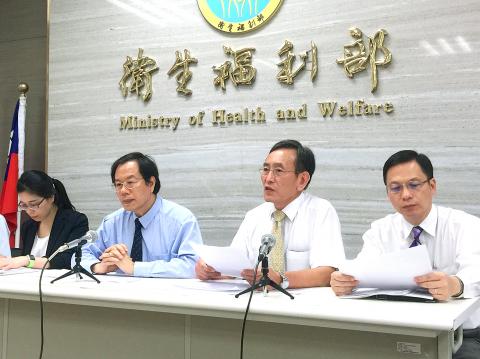The Ministry of Health and Welfare yesterday announced that the minimum threshold for imposing the National Health Insurance’s (NHI) supplementary premium on income from part-time jobs is to be raised from NT$5,000 (US$154) to NT$20,000, starting from Jan. 1 next year.
National Health Insurance Administration (NHIA) Director-General Huang San-kuei (黃三桂) said the new policy would benefit an estimated 3.42 million people, allowing them to pay an average of NT$784 less per year, while 2.28 million people would not have to pay the supplementary premium at all.
It will reduce NHI revenue by an estimated NT$4.2 billion per year (about 0.7 percent of the total revenue) — about NT$2.68 billion from supplementary premium payments and about NT$1.52 billion from the government.

Photo: CNA
The policy change is the result of the NHI system having collected more than NT$208.5 billion in its reserve fund (as of August) — exceeding the one to three months of safety reserve mandated by law, mainly from the collection of a supplementary premium from non-salary income (dividends, rent, professional fees and interest income) implemented in 2013.
However, Huang said the NHIA estimates that after implementing the new policy, a deficit will occur by 2017, and the reserve fund would only have about 2.56 months of safety reserve by 2019.
“NHI income will not increase, but the costs are increasing each year,” he said, adding that expenditure is expected to increase as a result of the aging population, as well as the introduction of new medicine and medical technology.
In response to questions whether the premium rate of 4.91 percent would also be adjusted, Minister of Health and Welfare Chiang Been-huang (蔣丙煌) said the rate would be adjusted according to economic conditions and reviewed each year, but so far the ministry does not plan to adjust the rate before 2017.
National Health Insurance Civic Surveillance Alliance spokesperson Eva Teng (滕西華) said the implementation of supplementary premium collection was problematic and unfair from the beginning, and that NHI payment should be collected according to total household income.

NATIONAL SECURITY THREAT: An official said that Guan Guan’s comments had gone beyond the threshold of free speech, as she advocated for the destruction of the ROC China-born media influencer Guan Guan’s (關關) residency permit has been revoked for repeatedly posting pro-China content that threatens national security, the National Immigration Agency said yesterday. Guan Guan has said many controversial things in her videos posted to Douyin (抖音), including “the red flag will soon be painted all over Taiwan” and “Taiwan is an inseparable part of China,” while expressing hope for expedited “reunification.” The agency received multiple reports alleging that Guan Guan had advocated for armed reunification last year. After investigating, the agency last month issued a notice requiring her to appear and account for her actions. Guan Guan appeared as required,

A strong cold air mass is expected to arrive tonight, bringing a change in weather and a drop in temperature, the Central Weather Administration (CWA) said. The coldest time would be early on Thursday morning, with temperatures in some areas dipping as low as 8°C, it said. Daytime highs yesterday were 22°C to 24°C in northern and eastern Taiwan, and about 25°C to 28°C in the central and southern regions, it said. However, nighttime lows would dip to about 15°C to 16°C in central and northern Taiwan as well as the northeast, and 17°C to 19°C elsewhere, it said. Tropical Storm Nokaen, currently

‘NATO-PLUS’: ‘Our strategic partners in the Indo-Pacific are facing increasing aggression by the Chinese Communist Party,’ US Representative Rob Wittman said The US House of Representatives on Monday released its version of the Consolidated Appropriations Act, which includes US$1.15 billion to support security cooperation with Taiwan. The omnibus act, covering US$1.2 trillion of spending, allocates US$1 billion for the Taiwan Security Cooperation Initiative, as well as US$150 million for the replacement of defense articles and reimbursement of defense services provided to Taiwan. The fund allocations were based on the US National Defense Authorization Act for fiscal 2026 that was passed by the US Congress last month and authorized up to US$1 billion to the US Defense Security Cooperation Agency in support of the

PAPERS, PLEASE: The gang exploited the high value of the passports, selling them at inflated prices to Chinese buyers, who would treat them as ‘invisibility cloaks’ The Yilan District Court has handed four members of a syndicate prison terms ranging from one year and two months to two years and two months for their involvement in a scheme to purchase Taiwanese passports and resell them abroad at a massive markup. A Chinese human smuggling syndicate purchased Taiwanese passports through local criminal networks, exploiting the passports’ visa-free travel privileges to turn a profit of more than 20 times the original price, the court said. Such criminal organizations enable people to impersonate Taiwanese when entering and exiting Taiwan and other countries, undermining social order and the credibility of the nation’s